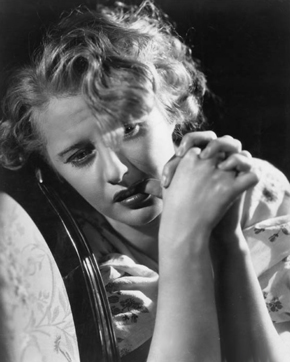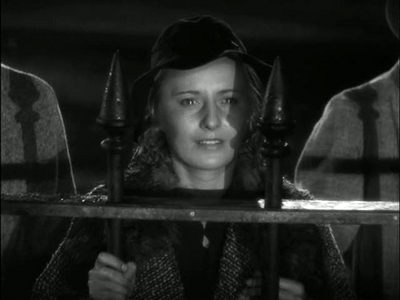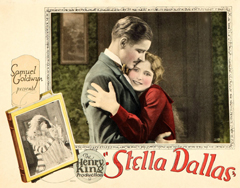
 |
|
|
|
There are women's pictures and there are women's pictures, but Stella Dallas has to be the mother of them all. Remade several times and loaded down with tear-jerking sentiments that only women are supposed to be able to appreciate, the movie is not without serious merit. The ironclad plot has as much to say about class division in America as does An American Tragedy. At least it would have, if author Olive Higgins Prouty's entire argument wasn't a stacked deck from the word Go. Samuel Goldwyn had already mined gold from this property in a silent version from 1925. Through the efficient direction of King Vidor star Barbara Stanwyck made Goldwyn even richer. The emotionally enduring show is not as dated or outrageous as one might think. It's capable of starting heated discussions about human relations, both mother-daughter and upper class vs. working class. The story opens on an ambitious girl with few prospects. Tired of living in her father's shack in a mill town, Stella Martin (Barbara Stanwyck) maneuvers her way into a marriage with Stephen Dallas (John Boles), a disinherited ex-millionaire. She gets Stephen on the rebound, when he's lamenting the wedding of his intended, Helen (Barbara O'Neil) to another man. Stella and Stephen's marriage goes on the rocks after their first child is born, when she refuses to alter her lifestyle to adapt to her husband's more genteel background. When he goes to New York she stays behind, befriending a lower-class businessman, Ed Munn (Alan Hale). As the daughter Laurel (Anne Shirley) grows up Stella's common manners and undignified behavior become a problem. Laurel spends more time with her father and the wealthy family of the now-widowed Helen. Stella eventually realizes that she's lost Stephen's love and that she's a liability to Laurel. Instead of seeking redress or revenge, Stella takes a series of selfless steps to insure that her daughter gets the things she's always wanted. 
The movie is fair-minded about its characters, but less tolerant of the 'common' Stella than it is of the genteel peers of her husband Stephen. Stella begins by scheming to get what she wants. She's serious and sincere but incapable of changing her basic nature, which the film identifies as hopelessly Low Class. At first the situation just seems unfair. Stella's nurses and husband don't want her dancing so soon after having a baby, but Stella can't help but ruffle feathers. She laughs like a dance hall girl and comes off as vulgar when in the company of her husband's reserved, conservative associates. Stella Dallas really knows how to lay class distinctions on thick. The movie buys into the proposition that affluent people know how to behave and those below simply do not; the classes automatically find their own level. Stephen is humbled after a family disgrace leaves him with nothing, but his inherent nobility makes him succeed in business on his own, so that in just a couple of years he regains his former place in society. In other words, money erases dishonor. Stella's dance partner Ed Munn is a fat loudmouth who smokes cigars and leaves hard liquor around the children, and Stella does nothing about it. The story doesn't really explain why Stella isn't willing to follow her husband to New York. It's clear that she isn't Ed Munn's lover, and she gives no reason why she would want to be separated from Stephen. But they move farther apart, especially when the rigged plot arranges for Stella and Ed to be found in some faux-compromising situation every time husband Stephen comes home. Stephen becomes re-acquainted with his original sweetheart Helen, who is now a widow with three boys, perfect gentlemen all. In the worldview of Stella Dallas, a prosperous upbringing means impeccable manners and gentility. These adolescents are next to ridiculous, acting as if brainwashed by some etiquette cult. But Stella's daughter Laurel is herself a patrician gem, sweet and adorable and possessed of better manners than Jackie Kennedy. The film doesn't say so, but we're to assume that it's because her father's blue blood is dominant; as soon as she's a teenager Laurel realizes that her mom is a frumpy embarrassment who wears loud and obnoxious clothing. We're meant to think that the rich kids that ridicule Stella aren't snobby jerks, but merely honest. That type of woman has no place in proper society. As for Stephen and Helen, they're living together but supposedly remaining chaste; they never utter a spiteful word toward Stella for blocking the divorce that would allow them to marry. Stephen and Helen (and eventually Stella) are far too noble to be human. It's a compliment to the movie that they remain compelling characters. 
(spoilers) Stella becomes a good egg once she knows the score, even though she causes everyone to believe that she's both a tramp and a horrible mother. Although Stella's really done nothing wrong, she sacrifices her life with her daughter and her personal future. She grants Stephen his divorce and sees her daughter married to a good boy (played by a young Tim Holt) without the liability of an un-presentable mother putting the curse on her high-toned lifestyle. Stella accomplishes this by driving Laurel away, pretending she doesn't love her or want her around. This behavior is of course contrary to 99.99999% of human mothers, but what's one more absurdity in a story like this one? Believe it or not, these relationships are so well established that Stella Dallas works like a charm. (bigger spoiler)The justly famous kicker ending has Stella, dressed in frowsy rags like charwoman, watching her daughter's wedding not as a participant but by standing outside on the cold street and peering through a window. She's been invited to the ceremony but doesn't dare show up, as Helen is now Laurel's mother in the society columns. The moment is pure corn and trumped-up flimflam, but its power is not to be minimized. The story has been a hit with viewers for more than a century now. (end spoiler)Barbara Stanwyck is always good, and her Stella is far different than her more glamorous roles. By the end, Stella doesn't even look like she's wearing makeup, and is the antithesis of Hollywood glamour. Anne Shirley is the young, pure-as-driven-snow Laurel, and John Boles (Frankenstein) is fairly good as her father. Note that even though Stephen Dallas is a prince, he's not a saint. Note in Stephen's first scene how dismissively he treats the factory clerk (Olin Howland of The Blob) while glad-handing his boss. Hattie McDaniel and her sister Etta play the maids that give the family the mark of distinction, while Ann Doran and Laraine Day are said to be two of the princesses in the society tennis set. A feeble-looking Marjorie Main plays Stella's mother. Barbara O'Neil's role is pivotal. As Stephen's second Mrs. Dallas, she intuits when Stella is faking being uncaring, and understands Stella's sacrifice for her daughter's sake. However, Helen's only return gesture to her husband's first wife is to have the curtains open so that Stella can watch the wedding with the rest of the riffraff on the street. There are limits, you know. 
Warner Home Video's DVD of Stella Dallas is a big improvement on MGM's disc from 2005. It's as if the image had been sharpened and steadied just a little bit, enough to make the improvement easily noticed. The transfer is cleaner as well. It may be a good thing that the Goldwyn Library has migrated to Warners, if only because it will be better maintained. It would be nice, however, if the new distributors could be really daring, and restore and release Otto Preminger's 65mm Road Show film of Porgy and Bess. The package back lists an extra as a "Stella Dallas Vintage Featurette." The item turns out to be a full transfer of Sam Goldwyn's silent 1925 version of the same story, directed by Henry King and starring Ronald Colman, Belle Bennett, Alice Joyce, Jean Hersholt and Lois Moran. The storyline and details of most scenes are identical, with Colman a moodier Stephen Dallas. But the King Vidor version is better. The transfer is of reasonable but unrestored quality.
On a scale of Excellent, Good, Fair, and Poor,
Stella Dallas rates:
Reviews on the Savant main site have additional credits information and are often updated and annotated with reader input and graphics. T'was Ever Thus.
Review Staff | About DVD Talk | Newsletter Subscribe | Join DVD Talk Forum |
| ||||||||||||||||||